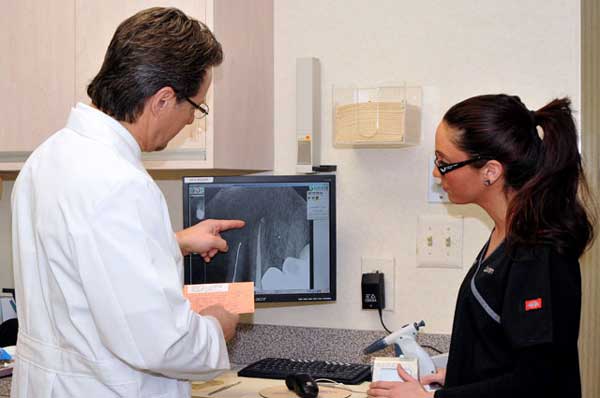
Completion of Root Canal Therapy
Your endodontic treatment has been completed. The canals have been cleaned and sealed to prevent future infection of the roots. The natural healing process will take some time. If treatment was performed today, it is possible to have some pain or discomfort for several days. If your discomfort does not go away, please call our office before returning to your family dentist.
It is important to continue to avoid chewing on the side of the treated tooth and to avoid hard or chewy foods until the tooth is permanently restored.
It is now your responsibility to make an appointment to see your family dentist as soon as possible for a permanent restoration of your tooth. Although the roots have been permanently sealed, the surface filling is only temporary and must be replaced. Often, teeth that have been treated by root canal therapy are heavily filled, patched, or weakened by decay. Your dentist may recommend a crown (cap) as the best restoration to adequately protect your tooth from future breakage.
We will send you a check-up notice approximately six months after treatment. Please be sure to call our office at that time to schedule a short, routine x-ray examination to insure that proper healing has occurred (even though your tooth may seem fine). There is no additional fee for this service.
Completion of Root Canal Surgery
1.) Some swelling and/or bruising may normally occur after surgery. In order to minimize swelling or bruising, apply an ice bag to your face as instructed, 10 minutes on and 10 minutes off for the remainder of the day, until bedtime. Application of ice tomorrow may also be helpful.
2.) Do not rinse, swish or swirl liquids, or spit out during the first 24 hours. After 24 hours, rinse gently after meals with a large glass of warm water mixed with 1/2 teaspoon salt.
3.) To prevent disturbance of the stitches and prevent delays in healing:
- Avoid raising the lip, which can pull on the stitches.
- Do not brush or floss for the first 24 hours; when brushing and flossing is resumed, be gentle and avoid the area of the surgery until the sutures are removed.
- For the next few days, avoid crunchy foods, such as pretzels, nuts, toast, potato chips and raw vegetables and chewy foods, such as steak or hard rolls; eat a soft solid diet, such as tuna salad, hamburger, mashed potatoes, etc.
4.) Over-the-counter pain relievers, such as ibuprofen (Advil, Motrin), acetaminophen (Tylenol), naproxen (Aleve), or aspirin (if you are allowed to take them) may be effective in controlling discomfort, or you may take prescribed pain medication if necessary. Narcotic pain medications may cause drowsiness, so avoid alcohol, driving, or operating dangerous equipment if you are taking them.
5.) If you have been given an antibiotic prescription, it is important that you fill it immediately and follow the instructions on the bottle carefully and completely.
6.) Avoid strenuous exercise or activities for at least 24 hours.
7.) It is best to minimize or avoid smoking during the first week following surgery, as it may slow healing.
8.) You will be given an appointment in 5-7 days for removal of stitches.
9.) Normal responses to surgery include facial swelling that begins after 48 hours and mild to moderate discomfort, which gradually diminishes after 48 hours. During the first 24 hours, slight oozing, with a tinge of blood in the saliva is also common. If bleeding persists, apply ice with continuous gentle pressure over the area for 15 to 20 minutes.
10.) Please call the office for instructions if you have persistent bleeding, pain that cannot be controlled with pain medicine, swelling that does not begin to subside after three days, loss of one or more sutures within the first three days after the procedure, or any problem that causes you concern.
Now that your surgical procedure has been completed and your sutures have been removed, you may resume normal toothbrushing and flossing. For the next few weeks, be gentle with the toothbrush in the area of the surgery, since the gums may remain tender for some time after surgery. A soft toothbrush is recommended.
If permanent restoration of the treated tooth is necessary (filling or crown), continue to avoid chewing on the affected side and return promptly to your dentist. If no permanent restoration is needed at this time, you may resume normal eating.
You will receive a check-up notice in approximately six months. Please call our office at that time to schedule a short, routine x-ray examination to insure that proper healing has occurred (even if the tooth seems fine). There is no additional fee for this service.
